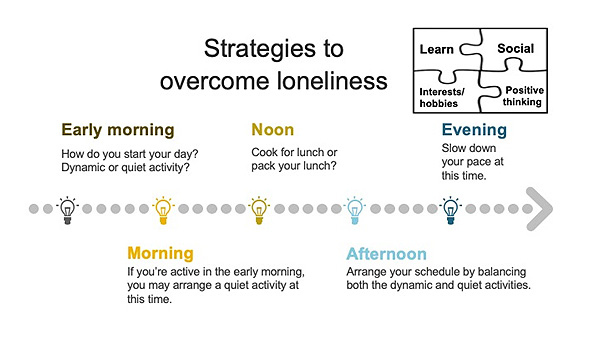 Topic: Seniors and Mental Health: Lost and Loneliness
Topic: Seniors and Mental Health: Lost and LonelinessDate and Time: August 2nd, 2022, 9.30 am-10.30 am
Speaker: Ms. Lee Li Li (PhD candidate in Gerontology Medical Science and Consultant Psychologist)
Feeling lost may suggest you are unsure of the next step in life. You may feel helpless, emotionally numb, or you may have lost the spark in everything you do. This can happen to anyone, regardless of age.
What does it mean when you “feel lost”?
It is normal to be feeling lost occasionally as this happens to all of us. Most importantly, you are still holding on the positive anticipation on the uncertain future. However, having negative expectations of an uncertain future increases anxiety and makes it easier to fall into pessimistic thinking. For example, experiencing self-denial, worrying about the (negative) thoughts of others, etc.
The relationship between lost and loneliness
It is common for people to feel lost at some point in their lives, depending on the particular trigger factor. For example, a senior might start to worry or have negative thoughts about their health condition after having a minor stroke or injury. The signs of feeling lost typically appear within 3 months after the triggering event. If the person chooses to cope by avoidance, the feeling of lost may persist over time. In this case, the person may become completely lost in their life. On the other hand, loneliness refers to the feeling of being alone, no matter how much social contact is involved. Lost and loneliness can sometimes go hand in hand if the person is not proactive about overcoming life challenges.
What makes the seniors to feel lost?
- Rapid technological change: : Seniors often struggle with reactivity, making it harder to keep up with the fast-paced technology. Besides, mastering new technology is much more complicated as the seniors generally have a lesser frame of reference to enable them to absorb new knowledge. Subsequently, these factors lead the seniors feeling disconnected and lonely.
- Uncertainty towards future: Lack of planning about the future
- Lack of self-awareness: One reason many people feel lost is that they are unaware of their values, priorities, strength, weaknesses, etc. Thus, it is suggested for seniors to note down your strength and weaknesses to learn more about yourself.
- Self-evaluation/self-confidence: A lack of self-confidence may lead to negative and permissive thoughts about oneself. Hence, the seniors may reflect and discover your interests and hobbies that help to alleviate your negative perspectives towards self.
Strategies to overcome the feeling of lost
| Learning | Interests and Hobbies | Social Contact | Cognitive Reappraisal Exercise |
|
|
|
|
Strategies to overcome loneliness

- Schedule your routine by including both dynamic and quiet activities
- Example: Early morning (exercise) + Morning (reading/learning) + Noon (lunch) + Afternoon (leisure activities/hobbies) + Evening (cognitive reappraisal exercise)
- For seniors who are still working, they may make adjustment accordingly. However, it is suggested to arrange quiet activity for evening time.
Notes: The above content was transcribed from our August 2nd, 2022 Unilifesity’s Elderly Enrichment Programme - Seniors and Mental Health: Lost and Loneliness. Please kindly contact our office if you would like to learn more or seek consultation. Thank you.





